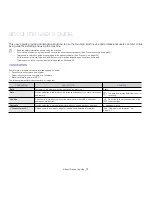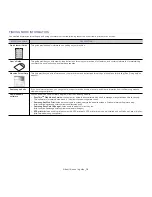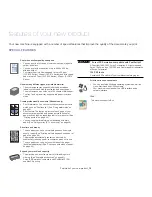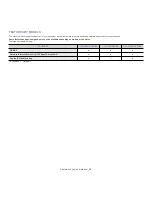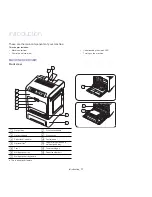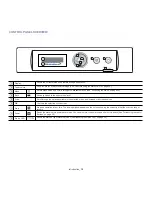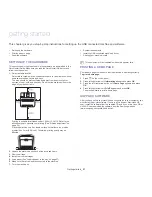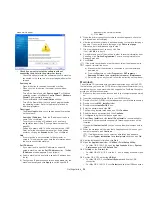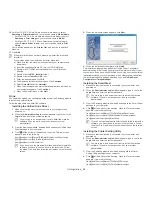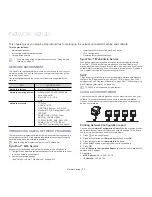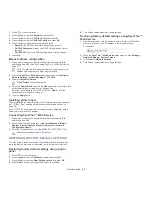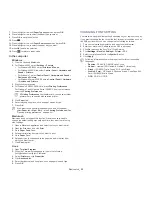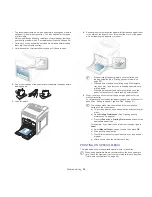
Getting started
_ 26
[root@localhost psu]#./install.sh
If you do not use the graphical interface and failed to install the
software, you have to use the driver in the text mode. Follow steps
3 to 4, and then follow the instructions on the terminal screen.
If the printer driver does not work properly, uninstall the driver and
reinstall it.
Follow the steps below steps to uninstall the driver for Linux.
a) Make sure that the machine is connected to your computer and
powered on.
b) When the
Administrator Login
window appears, type in “root”
in the
Login
field and enter the system password.
You must log in as a super user (root) to uninstall the printer
driver. If you are not a super user, ask your system
administrator.
c) Click the icon at the bottom of the desktop. When the Terminal
screen appears, type in:
[root@localhost root]#cd /opt/Samsung/mfp/uninstall/
[root@localhost uninstall]#./uninstall.sh
d) Click
Uninstall
.
e) Click
Next
.
f)
Click
Finish
.
SHARING YOUR MACHINE LOCALLY
Follow the steps below to set up the computers to share your machine
locally.
If the Host computer is directly connected to the machine with a USB cable
and is also connected to the local network environment, the client computer
connected to the local network can use the shared machine through the
host computer to print.
1
Host computer
A computer which is directly connected to
the machine by USB cable.
2
Client computers
Computers which use the machine shared
through the host computer.
Windows
Setting up a host computer
1.
Install your printer driver. (See "Installing USB connected machine’s
driver" on page 23, "Installing network connected machine’s driver"
on page 29.)
2.
Click the Windows
Start
menu.
3.
For Windows 2000, select
Settings
>
Printers
.
•
For Windows XP/2003, select
Printer and Faxes
.
•
For Windows 2008/Vista, select
Control Panel
>
Hardware and
Sound
>
Printers
.
•
For Windows 7, select
Control Panel
>
Hardware and Sound
>
Devices and Printers
.
•
For Windows Server 2008 R2, select
Control Panel
>
Hardware
>
Devices and Printers
.
4.
Right click your printer icon.
5.
For Windows XP/2003/2008/Vista, press
Properties
.
For Windows 7 and Windows Server 2008 R2, from context menus,
select the
Printer properties
.
If
Printer properties
item has
Ź
mark, you can select other
printer drivers connected with selected printer.
6.
Select the
Sharing
tab.
7.
Check the
Change Sharing Options
.
8.
Check the
Share this printer
.
9.
Fill in the
Share Name
field. Click
OK
.
Setting up a client computer
1.
Install your printer driver (See "Installing USB connected machine’s
driver" on page 23, "Installing network connected machine’s driver"
on page 29).
2.
Click the Windows
Start
menu.
3.
Select
All programs
>
Accessories
>
Windows Explorer
.
4.
Enter the IP address of the host computer in the address bar and
press Enter in your keyboard.
In case host computer requires
User name
and
Password
, fill
in User ID and password of the host computer account.
5.
Right click the printer icon you want to share and select
Connect
.
6.
If a set up complete message appears, click
OK
.
7.
Open the file you want to print and start printing.
Macintosh
The following steps are for Mac OS X 10.5~10.6. Refer to Mac Help
for other OS versions.
Setting up a host computer
1.
Install your printer driver. (See "Macintosh" on page 24.)
2.
Open the
Applications
folder >
System Preferences
and click
Print & Fax
.
3.
Select the printer to share in the
Printers list
.
4.
Select
Share this printer
.
Setting up a client computer
1.
Install your printer driver (See "Macintosh" on page 24).
2.
Open the
Applications
folder >
System Preferences
and click
Print and Fax
.
3.
Click the “
+
” icon.
A display window showing the name of your shared printer appears.
4.
Select your machine and click
Add
.


